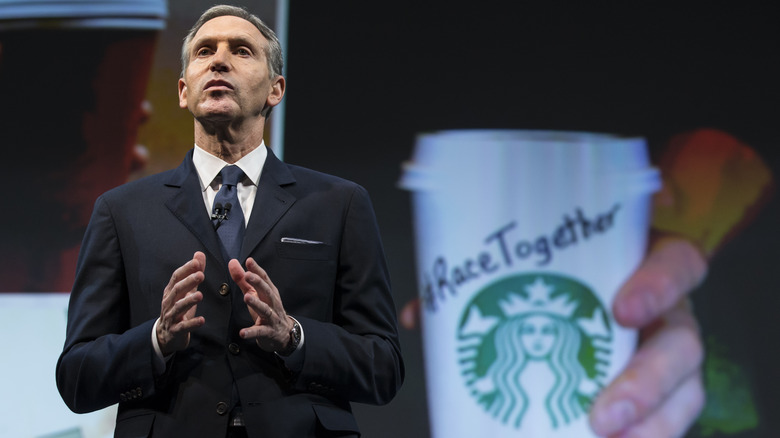The Controversial Reason Starbucks Higher-Ups Are Being Sued
Pumpkin spice latte season may be underway, but some coffee drinkers are choosing not to go to Starbucks this year.
The chain — along with its interim CEO Howard Schultz — has strongly opposed its workers forming a union, leading to the National Labor Relations Board filing an official complaint against Starbucks for violating U.S. labor law (via ABC News). The coffee chain has been in hot water with both its pro-union employees and customers, to the point that store walkouts and callouts from prominent politicians have occurred.
Supporters of unionization, however, aren't the only group that is currently unhappy with Starbucks over alleged civil rights violations. On top of the Labor Board's complaint, Starbucks will now also be battling a lawsuit issued by the National Center for Public Policy Research, Reuters shares. The conservative organization claims that Starbucks' diversity policies are racially discriminatory towards certain groups, and is therefore suing the current and former Starbucks executives who put those policies in place.
Dating back to 2020, these policies are based on a commitment to building a more diverse workforce (via Starbucks). The goal is to have 30% of Starbucks' corporate team identify as Black, Indigenous, or a person of color (BIPOC) and its retail sector be 40% BIPOC employees by 2025.
The lawsuit argues Starbucks commitment to diversity violates civil rights
Citing Starbucks' hiring policies, the National Center for Public Policy Research (NCPPR) claims that the emphasis on diversity is not only unfair, but is in violation of state and federal civil rights laws. These hiring practices affect both job applicants and shareholders, the conservative organization alleged in a press release.
"Starbucks has set goals for the number of 'diverse' — meaning not-white — employees it hires, and those goals are tied to executive compensation. That is outright racial discrimination," Scott Shepard, director of NCPPR's Free Enterprise Project, alleged in a statement. Shepard goes on to explain that the group believes Starbucks' "discriminatory policies" unlawfully take away employment opportunities and therefore civil rights from many Americans before doubling down on the perceived financial implication, claiming that Starbucks executives who enable these policies "are violating their fiduciary duties to their shareholders." In the filing, the NCPPR ultimately calls for Starbucks to eliminate its diversity policies and for the higher-ups to pay damages.
The diversity hiring goals were announced by Starbucks — along with similar policies created by numerous other companies — in the wake of nationwide protests after George Floyd was killed by a police officer (via Reuters). In addition to these goals, the chain also promised to incorporate anti-bias practices into its hiring process, as well as have data about its workforce diversity viewable to the public.

